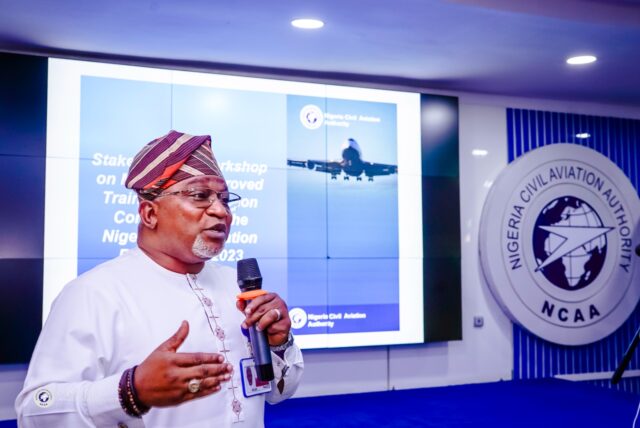The Director General of the Nigeria Civil Aviation Authority (NCAA), Captain Chris Najomo, has called on Approved Training Organisations (ATOs) to ensure strict compliance with Nigeria Civil Aviation Regulations (Nig. CARs) to maintain high safety and training standards in the aviation sector.
Speaking on Monday at a stakeholders’ workshop on “Managing Approved Organisations’ Compliance with the Nigeria Civil Aviation Regulations (Nig. CARs)”, Najomo emphasized the crucial role ATOs play in producing well-trained aviation professionals. He noted that maintaining high-quality training and compliance is essential for ensuring safety, efficiency, and international competitiveness.
Najomo, represented by NCAA’s General Manager of Licensing, Mr. Hyelni Bassi, highlighted the increasing challenges facing training organizations, including rapid technological advancements, evolving regulatory frameworks, and the growing complexity of aviation operations. He urged stakeholders to adopt a proactive and collaborative approach to address these challenges.
“The industry, aviation professionals, and ultimately, the traveling public depend on the rigorous training and compliance measures that we establish together,” Najomo stated. “This workshop provides an opportunity to share insights, discuss best practices, and foster a culture of transparency and accountability in training programs.”
Taking stakeholders through the regulatory requirements for ATOs, the Head of the ATO Inspectorate, Adoyi Sunnie, explained that many training organizations fail to meet NCAA’s compliance standards. He emphasized that ATOs must maintain adequate facilities, provide necessary technical data, equipment, and training materials, and ensure they have competent instructional personnel to supervise training effectively.
Sunnie also stressed the importance of implementing proper policies, procedures, and a functional Safety Management System (SMS) to meet international aviation standards. He noted that while Nigeria faces challenges in attracting international trainees, enhancing training quality and compliance will improve the country’s global competitiveness.
“We are leveraging technology to enhance efficiency and ensure that safety oversight activities are conducted without compromising standards,” Sunnie added.
Najomo concluded by urging ATOs to not only meet but exceed the expectations set by the Nigeria Civil Aviation Regulations, ensuring that the nation’s aviation training sector remains globally competitive and safety-focused.













